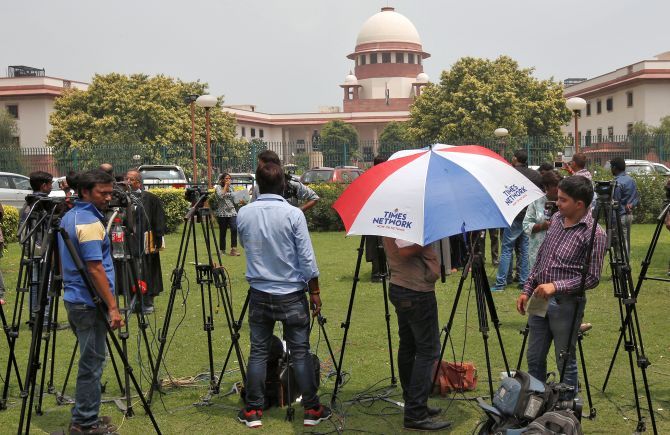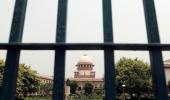
The Supreme Court on Wednesday took a major leap in imparting transparency in the functioning of the judiciary by allowing live-streaming of court proceedings of cases of constitutional and national importance, saying this openness was like 'sunlight' which is the 'best disinfectant'.
It said as a pilot project, only a specified category of cases which are of constitutional or national importance and are being argued before a constitution bench, should be live streamed.
The top court said that sensitive cases such as those dealing with matrimonial disputes or sexual assault should not be live streamed.
A bench of Chief Justice Dipak Misra and Justices A M Khanwilkar and D Y Chandrachud, in two different but concurring judgments, said, "We hold that the cause brought before this court by the protagonists in larger public interest, deserves acceptance so as to uphold the constitutional rights of public and the litigants in particular".
"Above all, sunlight is the best disinfectant," Justice Chandrachud, writing a separate concurring verdict, said, adding that live streaming 'as an extension of the principle of open courts will ensure that the interface between a court hearing with virtual reality will result in the dissemination of information in the widest possible sense, imparting transparency and accountability to the judicial process'.
Justice Khanwilkar, who penned the verdict for the CJI and himself, said "In recognizing that court proceedings ought to be live streamed, this court is mindful of and has strived to balance the various interests regarding administration of justice, including open justice, dignity and privacy of the participants to the proceedings and the majesty and decorum of the Courts".
Highlighting the contours of the live-streaming mechanism, he said, "To begin with, only a specified category of cases or cases of constitutional and national importance being argued for final hearing before the Constitution Bench be live streamed as a pilot project".
The bench said that for live-streaming, the permission of the concerned court will have to be sought in writing, in advance, in conformity with the prescribed procedure.
The bench, however, said that 'the concerned court would retain its power to revoke the permission at any stage of the proceedings suo motu (on its own) or on an application filed by any party to the proceeding, if the situation so warrants'.
The top court said, "There must be a reasonable time-delay (say ten minutes) between the live court proceedings and the broadcast, in order to ensure that any information which ought not to be shown, as directed by the Court, can be edited from being broadcast".
It said that till a full-fledged module and mechanism for live streaming of the court proceedings of the apex court over the internet is evolved, the first phase of live streaming would start from designated areas in the apex court.
The court listed the designated areas as a dedicated media room for litigants, interns and advocates, having special provisions to accommodate differently-abled people.
Other designated areas include the Supreme Court Bar Association room, the Supreme Court Advocates-on-Record Association room, official chambers of the Attorney General, Solicitor General and Additional Solicitor Generals, advocate chambers and the Press Reporters room.
It said 'the focus of the cameras in the courtroom will be directed only towards two sets of people--the judges hearing the matter and at such an angle so as to only show the anterior-facing side of the Justices, without revealing anything from behind the elevated platform/level on which the Justices sit'.
The cameras would also show the arguing advocates from such an angle that it does not reveal in any way the contents of notes or reference material being relied upon.
The bench said that the copyright over the broadcasted material will be retained by the court which will have the final say in respect of use of the coverage material.
Justice Chandrachud said those people who are not personally involved in litigation, depend on the information provided about judicial decisions in newspapers and in the electronic media.
"The time has come for this Court to take a step further in adopting technology and to enable live-streaming of its proceedings. Live-streaming of courtroom proceedings is an extension of the principle of open courts. Live-streaming will have the ability to reach a wide number of audiences with the touch of a button," he said.
Justice Chandrachud justified live-streaming by saying that 'the technology of live-streaming injects radical immediacy into courtroom proceedings. Each hearing is made public within seconds of its occurrence'.
"It enables viewers to have virtual access to courtroom proceedings as they unfold," he said and added that the introduction of live-streaming will effectuate the public's right to know about court proceedings.
The two separate verdicts of the judges relied on the practices adopted in various courts in the world and said it appeared that broadcasting of courtroom proceedings emerged in several countries through judicial decisions.
The practices in countries like Australia, Brazil, Canada, China, England, European Court of Human Rights, Germany, Ireland and Israel were relied upon by the top court.











 © 2025
© 2025